loyola llothta
☭☭☭

This is the police unit in PAP, #Haiti that shot & killed students today. CIMO police unit driving vehicle with license plate #1-00179. Have photos & identities of the victims.
12
1:04 AM - Jun 27, 2019

This is the police unit in PAP, #Haiti that shot & killed students today. CIMO police unit driving vehicle with license plate #1-00179. Have photos & identities of the victims.
12
1:04 AM - Jun 27, 2019
Human Rights groups & Intl Community largely silent over attempted abductions & death threats that have forced two members of govt commission investigating #PHTK fraud in #Haiti to flee and has forced others into hiding. https://www.haitilibre.com/en/news-28096-haiti-flash-csc-ca-judges-death-threatened-would-have-left-the-country.html …
1
7:34 PM - Jun 28, 2019
Armed govt-sponsored gangs are openly working with #Haiti's govt police. Together they have reportedly shot & killed 5 protesters today while there are reports detainees are being arrested & handed off to unmarked vehicles belonging to gangs. Activists are disappearing.
71
6:32 PM - Jun 24, 2019
Today is the first day of a national strike in #Haiti to unseat the #PHTK & Pres @moisejovenel called by the Democratic Sector and Lavalas. There are more cops & journalists in the streets than people.
23
3:56 PM - Jun 24, 2019
Today in #Haiti's capital you can see govt-sponsored gangs with automatic weapons controlling one corner with a uniformed policeman standing casually just across the street.
36
3:50 PM - Jun 24, 2019
Definition of INSANITY, repeating same thing expecting different results: "Resolution passed today by @UN Security Council states @UN Integrated Office in #Haiti (#BINUH) will help government organize free, fair & transparent elections & strengthen the capacity of the police."
12
2:15 AM - Jun 26, 2019
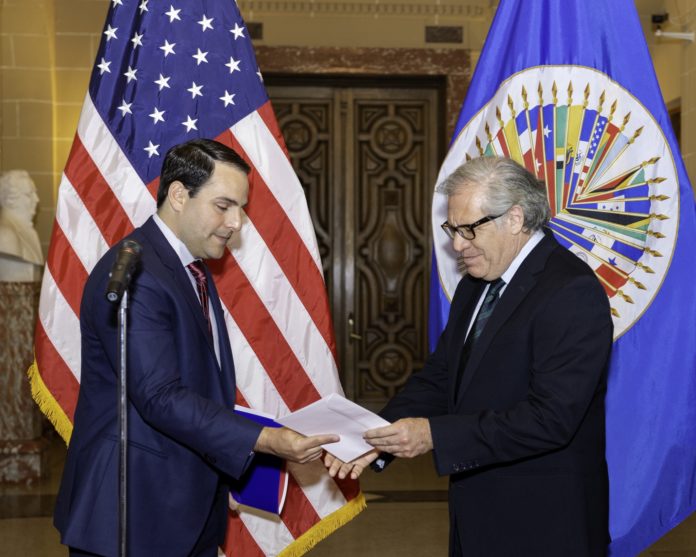
In December 2010, Haiti’s Provisional Electoral Council (CEP), legally the “final arbiter” of Haitian elections, found that candidates Mirlande Manigat and Jude Célestin won a Nov. 28, 2010 first round presidential election and were to go to a run-off. But Washington used a debunked OAS report to justify forcing then President René Préval to replace Célestin, the candidate of his party, with Martelly, who had come in third. The CEP, however, did not agree with the swap.
As Haiti Liberté reported at the time,“only four of the eight-member (…) CEP have voted to proceed with the [changed] second round, one short of the five necessary. Furthermore, the first round results have not been published in the journal of record, Le Moniteur, and President René Préval has not officially convoked Haitians to vote, both constitutional requirements.”
THERE IS NO SECTOR OR ORGANIZATION WILLING TO SIT DOWN WITH THE EMBATTLED PRESIDENT
Colin Granderson, the head of the OAS/Caricom election observers, was completely aware of the second round’s illegality but minimized it as “one of our concerns.” The OAS approved Martelly’s victory anyway.
Last week, the OAS outraged the Haitian people once again by scrambling a make-shift delegation to Haiti to propose that Moïse dialogue with representatives of the tens of thousands of Haitians weekly demanding his resignation. Unfortunately for the OAS and Moïse, there is no sector or organization willing to sit down with the embattled president, all saying that he has lost all credibility.
Sir Ronald Sanders, Ambassador of Antigua and Barbuda to the United States and the OAS, lambasted the Jun. 19 OAS delegation to Haiti as part of an increasing “pattern of ignoring established procedures and authority” because it was sent “without any discussion or mandate by the Permanent Council, the organ responsible for making and overseeing policy between General Assemblies,” he wrote in an article for the Caribbean News Service.
“Instead of action being taken on the authority of the Permanent Council after due deliberation and decision, the visit of a delegation to Haiti seems to have been organized between the Ambassador of the United States, Carlos Trujillo, and the Secretary-General, Luis Almagro in response to a letter of invitation from the Government of Haiti that, most unusually, was not distributed to OAS member states as is the norm,” Sanders wrote. “It is most unlikely, having not discussed, authorized, or mandated the delegation to Haiti and having never been made privy to the Haitian letter, that the entire Permanent Council of the OAS can embrace it, particularly as, according to media reports, the OAS was vilified by protestors.”

Haitians demonstrating against OAS meddling in Haiti in January 2016. The Haitian people are very distrustful of the OAS.
Indeed, the unauthorized OAS delegation, which stayed in Haiti only five hours, consisted solely of Trujillo, U.S. Ambassador to Haiti Michele Sison, OAS Haiti representative Cristobal Dupouy, and Gonzalo Koncke, chief of staff for OAS Secretary General Luis Almagro.
“I really don’t see why most of you are upset about the OAS position in this crisis, as if you forgot that it’s this same OAS which came to validate the trickery and falsification in the 2010 election so that their candidate could go to the second round,” tweeted in Kreyòl former Haitian police chief and presidential candidate Mario Andrésol. “The OAS position is clear; if we want change, we have to change our battle strategy.”
The current uprising is spawned by the collapse last year of Haiti’s PetroCaribe deal with Venezuela, brought down, in large part, by U.S. sanctions against the Bolivarian Republic. Under the accord, Venezuela provided Haiti with some $4.3 billion in oil, 40% of whose revenues Haiti kept in the PetroCaribe Fund, repayable after 25 years at 1% interest. The capital account was to be used for social improvement works like roads, schools, and clinics. But PHTK governments embezzled about 74% of the fund into bogus projects, two Senate investigations and a court audit have found.
With the end of cheap Venezuelan oil and credit and following International Monetary Fund demands, the Moïse government tried to hike fuel prices last July, igniting a three day uprising. That spawned anti-corruption demonstrations which first asked “Where did the PetroCaribe money go?” Now they demand that Moïse step down.
The most recent revolutionary upsurge was sparked by a May 31 court report which shows that Moïse took an active part in bilking Haiti’s masses of millions in PetroCaribe solidarity funds.
Since Haiti reversed its position and voted at the OAS on Jan. 10, 2019 not to recognize Nicolas Maduro as Venezuela’s president, Washington has sent a constant stream of U.S. officials to Haiti, seeking to buttress the besieged regime. The illegitimate OAS delegation seems to have had the same purpose.
“THE OAS HAS NO REAL CONTRIBUTION TO MAKE TO THE RESOLUTION OF THE HAITIAN CRISIS”
Indeed, OAS Secretary General Almagro has led Washington’s charge against Venezuela in the OAS. It is not surprising to see him and Trujillo plot together, leaving out other OAS members, to save Moïse, whose OAS vote they need in their continuing campaign against Maduro.
“The OAS, which only encourages political depravity in the region, particularly in Haiti, has no real contribution to make to the resolution of the Haitian crisis,” wrote the anti-corruption group Nou Pap Konplis (We Will Not be Complicit) in a Jun. 19 statement. “On the contrary, the OAS visit only makes matters worse. In fact, we [Haitians] can only rely on ourselves to solve this problem.”
“Because of its partisan positions, its unconditional support for the corrupt PHTK regime, and for being one of the architects which contributed to putting the current regime in place, the OAS is unworthy of mediating between the opposition constituted in different organizations, the majority of the population, and Jovenel Moïse,” Nou Pap Konplis continued, concluding that “we believe that [the OAS] mission failed and was pitifully mistaken in believing that it was authorized to teach Haitians anything and to give them orders. It is not up to the OAS to dictate what attitude or behavior we should adopt.”
Third week of strikes and protests in #Haiti. Once again the criminal government desperate to hold on to power hired mercenaries to kill protesters. Another day, another massacre.
55
5:11 PM - Jun 24, 2019
Judges in #Haiti handling the case of the stolen $4B petrocaribe loan have been receiving death threats. Two were forced to flee the country. In 2013, the first judge that handled the case died mysteriously. Clearly, very powerful people are involved in this financial crime.
30
10:29 PM - Jun 27, 2019
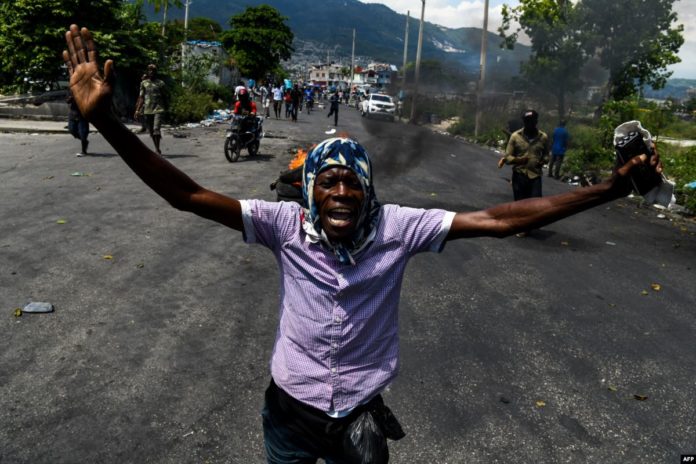
Not that Washington has always opposed regime change in the world’s first black republic. A decade ago, presidents Bush père et fils approved and backed coup d’états twice, in 1991 and 2004, against Haitian President Jean-Bertrand Aristide, a left-wing populist chosen in the country’s first free elections. As with Iran and Venezuela, those were what The Intercept’s Jeremy Scahill (2/20/19) called “Regime Change We Can Believe In.”
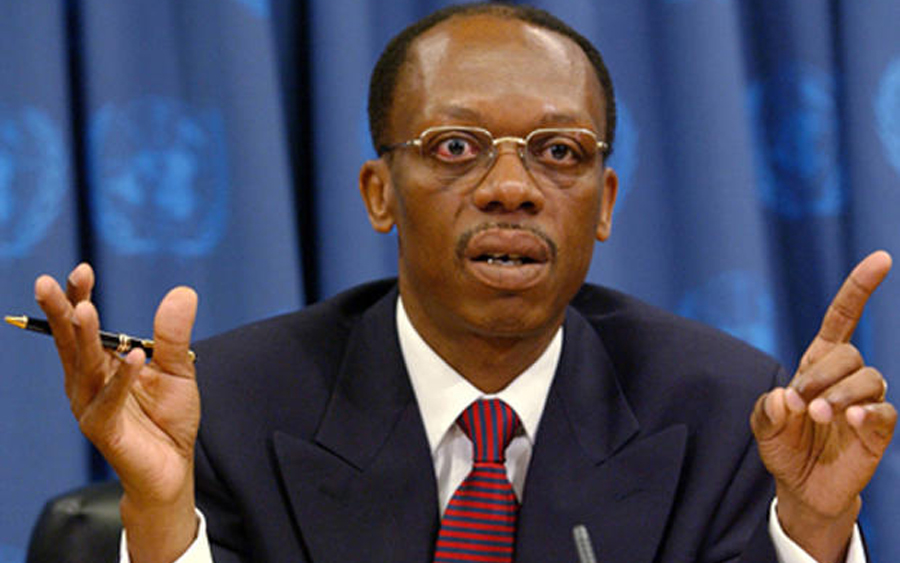
Washington has not always opposed regime change in Haiti. Both Presidents Bush backed coups d’état in 1991 and 2004 against Haitian President Jean-Bertrand Aristide.
But unlike Aristide, and unlike Venezuela’s President Nicolás Maduro, President Jovenel Moïse is Washington’s “man in Port-au-Prince.” He was hand-picked by Michel “Sweet Micky” Martelly, the previous Washington-approved president, and had pledged to follow his “Haiti Is Open for Business” neoliberal policies.
Is that why corporate media are not calling for the replacement of the Haitian government? In any case, they’re doing very little to inform U.S. audiences of the increasingly dire crisis in that country, caused in no small part by the two Aristide-overthrows and a series of harmful U.S.-imposed “free trade” policies starting back in the 1980s.
No matter that tens of thousands are in the streets. Moïse stays.
Even though the 2016 Haitian elections were largely discredited, and only 21% of the population even bothered to vote—“the lowest participation rate for a national election in the Western Hemisphere since 1945,” according to a reportfrom the Institute for Justice and Democracy in Haiti—the U.S. government has consistently backed Moïse.
Even though the U.S. State Department warns travelers of “crime, civil unrest and kidnapping”; even though Moïse has been accused by his own government auditors of benefiting from an “embezzlement scheme” in connection with the Venezuelan PetroCaribe program, which financed billions of dollars worth of post-earthquake projects; even though the economy continues to deteriorate, with many public institutions closed for over a week and state employees going unpaid for over a month; even though the UN says the country is experiencing a “humanitarian crisis”; even though violence and lawlessness are on the rise (a recent UN report implies police were present at the “La Saline massacre,” which involved the murder and dismemberment of at least 26 people and two gang rapes in one of the capital’s poor neighborhoods), and even though the massive protests against the PetroCaribe corruption scandal are more than mere demonstrations—they are an “uprising.”
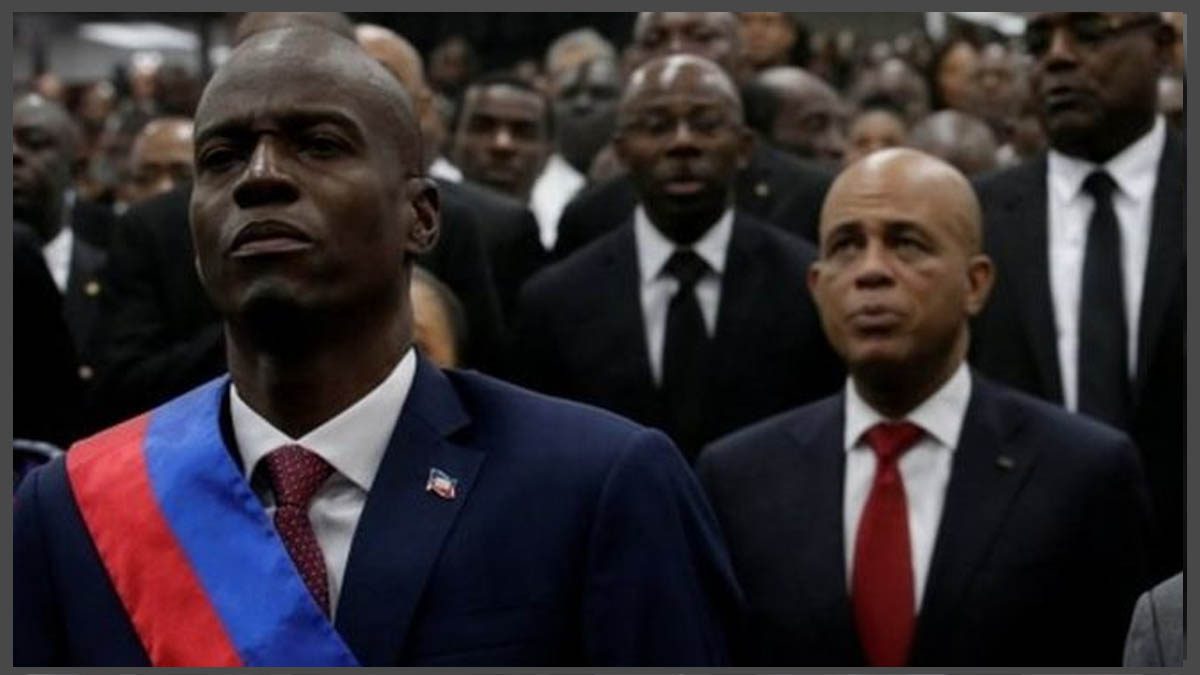
President Jovenel Moïse (left) is Washington’s “man in Port-au-Prince,” hand-picked by Michel “Sweet Micky” Martelly (right), the previous Washington-approved president.
To give them credit, a few corporate media outlets—like the Miami Herald (6/4/19) and NPR(6/11/19)—have done some good stories on the protests and the scandal, as well as on the La Saline massacre.
But most news outlets don’t even run AP stories, and aside from some opinion pieces, reporting has not dug too deep.
Worse, the Miami Herald’s Jun. 19 story on a “fact-finding” delegation from the Organization of American States (OAS) did far more damage than just sticking to the shallows. Reporter Jacqueline Charles acted as an information conveyor belt for empire when she cited an unnamed OAS “official” who was doing more than “find facts.”
The article—headlined “OAS Tells Haiti Opposition to Back Off”—quoted the anonymous official seven times, giving the opposition and protest movement its marching orders. “If you don’t like Moïse, the solution is to beat him at the ballot box,” Charles quoted the official. “We are not going to ask him to resign.”
That’s funny; not long ago, the OAS did ask a president to resign.
ELITE MEDIA JOURNALISTS AND COMMENTATORS HAVE ENDORSED WASHINGTON’S BLATANT AND REPEATED IMPERIALIST DESIGNS AND INTERVENTIONS IN HAITI FOR OVER A DECADE.
On Jan. 19, the body voted to “not recognize”Maduro as president of Venezuela, saying that his election had been faulty, and that it was concerned about the worsening political, economic, social and humanitarian crisis in Venezuela resulting from the breakdown of democratic order and serious human rights violations.
That laundry list could if anything be applied more easily to Haiti. But the message the OAS sent to Haiti through the Miami Herald was the opposite.
But was that really a message from the OAS? Or was it from the hemisphere’s hegemon?
At least one of the organization’s ambassadors, Sir Ronald Sanders of Antigua, penned a statement over the weekend to denounce the delegation, saying it was not official and lacked a formal mandate from the body. He noted that it represented an increasing “pattern of ignoring established procedures and authority.”
Unsurprisingly, the visitors—who met with the president behind closed doors, and then left without giving any official statement—were led by U.S. Ambassador Carlos Trujillo. Score one for empire?
By the time the letter from the Antiguan ambassador hit a few Haitian media outlets, the Miami Herald’s “scoop”—or more accurately water-carrying—had been translated and circulated throughout the country.
Haitian and foreign readers and viewers would be so much better served if corporate media could follow the advice of its own codes of ethics, like the one from the Society for Professional Journalists which says, “seek the truth and report it,” “do no harm”—and “consider sources’ motives before promising anonymity.”
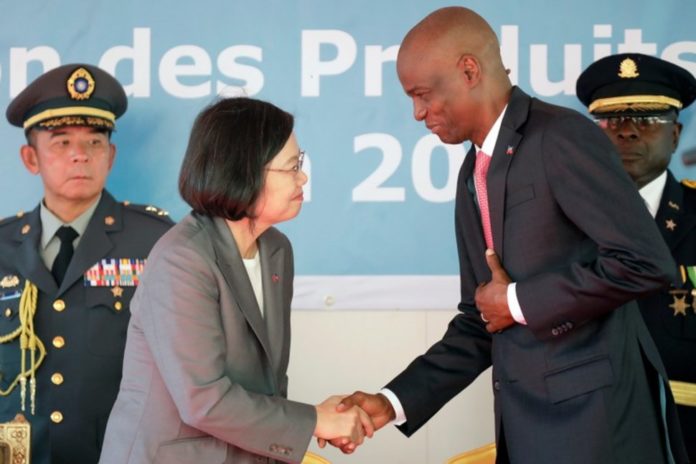
Taiwan Tries to Bolster Jovenel, Albeit Briefly | Haiti Liberte“There is a project to bring electricity to 51 towns and the metropolitan region – I’m referring to the construction of a network for the metropolitan region from Bois-Neuf to Léogane,” waxed President Moïse.
However, the project isn’t going anywhere. The Haitian Parliament hasn’t yet approved it. Many Haitian legislators are eyeing the fantastic developments next door in the Dominican Republic, which forsook the Republic of China (as Taiwan calls itself) to establish diplomatic and economic relations with China in May 2018. Since then, China has offered the DR some $3 billion in loans and integration into its globe-spanning “One Belt, One Road” Initiative, which is bringing infrastructure development and investment to 152 countries and international organizations in Asia, Europe, Africa, the Middle East, and the Americas.
Meanwhile, China has offered Haiti $4.7 billion to completely overhaul the tangled and crumbling infrastructure of the capital, Port-au-Prince.
Haiti is one of only 16 countries (17 if one counts the Vatican’s Holy See), out of 195 worldwide, which recognize the Republic of China instead of China proper. Only five of the countries have a population over two million.
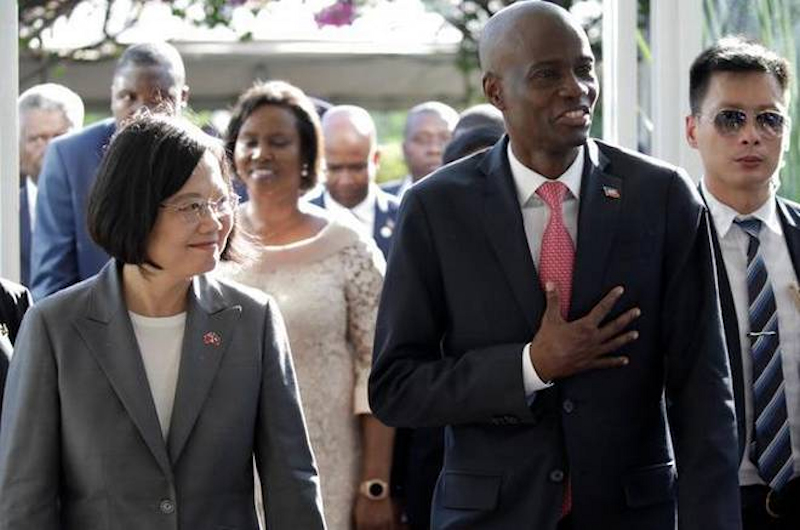
Tsai Ing-wen and Jovenel Moïse walked and posed for photo ops, but she only met with him for 20 minutes.
Taiwan is an island province of China which broke away when the dictator Chiang Kai-shek fled there after the 1949 Chinese revolution. Ever since, Taiwan has been a virtual client-state and protectorate of the United States. Washington’s subversion of China’s determination to reintegrate Taiwan could end up being one of the sparks that ignites World War III.
In May 2018, Jovenel Moïse led a 30-person delegation for a week-long visit to Taiwan. He returned all but empty-handed. Taiwan maintains its grip on its allies through small, strategic bribery rather than grand projects.
Tsai’s visit to Haiti was extremely brief probably because security in the capital is so bad and President Moïse is so politically toxic. Almost weekly, large demonstrations rock Port-au-Prince and other cities demanding his resignation. Even his former political allies, epitomized by Sen. Youri Latortue, are deserting him to join the opposition.
THE TRUMP ADMINISTRATION HAS DRAMATICALLY INCREASED U.S. AID, COURTSHIP, AND DIALOGUE WITH TAIWAN
In contrast to her four-hour visit to Haiti (population 11 million), Tsai next made a four-day visit to St. Kitts and Nevis (population about 56,000), another of the 11 micro-nations which diplomatically recognize Taiwan. Her 12-day tour takes her also to St. Vincent and the Grenadines, and St. Lucia.
Although Washington has recognized China since 1971, the Trump administration has dramatically increased U.S. aid, courtship, and dialogue with Taiwan, a figurative finger in China’s eye. Tsai’s latest trip has been particularly provocative.
“The U.S. government has been letting Taiwanese leaders stop over [on U.S. soil] since the 1990s… a couple of times a year when they were on their way to see formal diplomatic allies in Latin America or elsewhere,” explained the Los Angeles Times’ Ralph Jennings. “But the locations, time frames, and activities allowed regarding those landings have been a barometer both of U.S.-Taiwan relations and how the two sides regard China at any given moment. Keen to build economic ties with China, Presidents Clinton, George W. Bush and Obama would often restrict stops to distant spots such as Anchorage or Guam, sometimes just for hours rather than days.”
But these days, with a trade war raging and hostilities growing, “the U.S. government isn’t trying to hide such visits. On Thu. [Jul. 11], Taiwan President Tsai Ing-wen arrived in New York for two days. Later this month, she is scheduled to pass through Denver for two more days,” Jennings wrote.
Add to this that Washington is this year selling $2.2 billion worth of advanced weapons to Taiwan including 108 General Dynamics Corp M1A2T Abrams tanks and 250 Stinger missiles. This is akin to China selling Texas vast amounts of arms if it were to secede from the United States.
So while “Washington remains [Taiwan’s] most powerful unofficial ally and biggest arms supplier,” writes the Agence France Presse, it has also “pressured Haiti to maintain its relationship with Taipei.”
However Tsai, with her delegation including three parliament members, the president of the private business sector association, and Taiwanese entrepreneurs, apparently felt it prudent to visit Haiti as briefly as possible.
Rather than reinforcing Jovenel Moïse, her lightening visit may have only helped to underscore Moïse’s growing weakness, fragility, and unpopularity.
 @loyola llothta
@loyola llothta